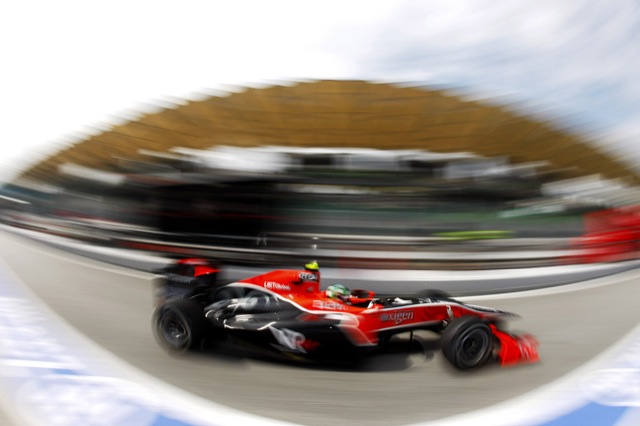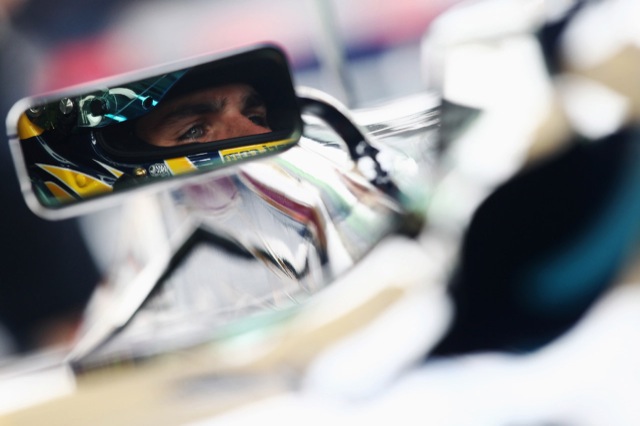In my posts regarding super licenses and the driver’s bemoaning of the sharp increase in fees from 2007 to 2008, and then to 2009, some comments alluded to the drivers being wealthy enough to not have to worry about a couple hundred grand for a license to race. In essence, the comments were quite correct; the drivers are paid well and the super license is necessary to place controls on who can and who cannot race. So why are they complaining to the FIA?
Over the course of the last season, the drivers met with the FIA and Max Mosley regarding the increase in fees for the mandatory super license. According to the GPDA, who issued a statement today regarding the ongoing issue, they were not consulted or informed of the increases made between 2007 and 2008, and only found out when the team’s received their invoices and the story hit the media headlines.
This doesn’t sound like unusual activity for the FIA, who stripped Canada of their grand prix without as much as a telephone call, according to reports at the time. The GPDA have also stated that the FIA had requested details of the driver’s salaries so they could better ascertain what an appropriate fee should be, to which the driver’s declined citing that this information is confidential and only known by the relevant teams, the drivers management and financial advisors and of course, the relevant taxation authorities.
The drivers appear to be concerned that their super license funds are being used to make up a shortfall in the operating expenses of the FIA as well as the continuous improvement of safety in the sport. The statement reads:
The drivers contend that the Super Licence fees should not be a revenue stream for the FIA and such a change constitutes a major departure in principle for both past Super Licence fees and fees for any other drivers’ licences. The FIA should raise sufficient funds from the exploitation of its commercial rights.
As a principle, the drivers should not be taxed to fund the costs of others fulfilling their legal duty to the drivers. It is the teams’ duty to provide the driver with a safe car, it is the circuit owners’ duty to provide a safe circuit and it is the duty of the manufacturers to provide helmets, fireproof overalls, etc. fit for the purpose of safety.
The FIA, as the governing body, has a duty to impose safety regulations and to supervise through licensing the parties carrying out their duties, e.g. licensing a circuit. The licensing process for drivers is to ensure that the drivers are competent to race at the level necessary in Formula One.GPDA Statement.
The statement goes on to talk about about how the drivers attempted to resolve the matter privately, which culminated in a meeting at the Italian Grand Prix last year. This is where Mosley asked for the drivers gross earnings.
The drivers are not opposed to a reasonable increase in the Super Licence fees, the fee which should cover the administrative and other costs relating to the issue of the licence. Therefore, the drivers have offered to pay the 2007 Super Licence fees adjusted upwards by inflation for the 2008 season with a corresponding increase for the 2009 season.
In addition, the drivers have offered to explore fair ways in which they can assist the FIA in raising funds to meet the apparent €1.7 million shortfall required to run the Federation in 2008 and a further €3 million shortfall that will be required in 2009, according to the figures cited by Mr. Mosley at Monza. GPDA Statement.
According to Autosport, Mosley has said that any driver without a super license will not be able to race in the championship.
All I can say is that nobody is going to drive in a world championship race in Australia unless they have a superlicence.
In the present climate, somebody who is earning several million a year and doesn’t want to spend one or two percent of that to get a licence for his trade is not going to get a lot of sympathy. And maybe we will have a quiet Friday in Melbourne… Max Mosley.
From what has been said and written, it seems as though the drivers have a fair point. If their collected fees are being used for more than just improved safety and administration costs involved with processing and issuing licenses, then that is sort of wrong. And despite myself just saying that some of the money should be spent on safety, the drivers are also correct in pointing out that the teams provide safe cars, the circuits provide safe circuits and other suppliers supply safe equipment. It is up to the individual companies to ensure their products meet certain criteria. The only issue I can see here is one of policing. If the FIA need to check that these companies are producing safe products, then perhaps some of the funds raised from the licenses should be used for this.
However, Mosley also makes a fair point about the percentage of a driver’s earnings being discussed here. Assuming the average net income of a midfield driver is €1m, then should they really be moaning about having to fork out €100k for a license that allows them to race and to earn that €1m? Admittedly, and once again assuming the €1m figure again, the fee is a lot more than the suggested 1% or 2% that Mosley mentioned. Five-to-ten times more, in fact. Although it should be pointed that in the case of Kimi Raikkonen, whose annual salary has been suggested at around €40m on Wikipedia, his super license fee will only be about 0.5% of his income.
So what say you? Rich kids moaning, or racing drivers raising a fair point?


















There is no reason why a license fee should cover more than the administrative cost of running the super license system. What has safety cost to do with licenses? What safety is Max talking about? The circuits cover their own safety costs so it can only be the FIA’s costs which is the responsibility of Max as president to finance from FIA funds. Why should a contribution from the license fee be needed now when it was not required in the days of the initial investment in safety which is where the highest costs are not in maintaining a standard.
Presumably if we follow Max’s argument he makes a contribution to the FIA’s safety budget to cover its offices and his flights and no doubt he contributes towards the federation’s various insurance policies.
I have a vague memory that in years past, drivers had to meet some (loose) qualifications in order to obtain a super license. When the fees become a revenue stream for FIA, they have less incentive to turn down unqualified drivers. Couple that with the upcoming rules that allow low-budget teams to enter F1, we might see a new batch of pay-drivers in the near future. Drivers who may not really be qualified to race in F1 but may still be let in because hey, money is money.
Overall, turning licensing fees into a revenue stream creates a conflict of interest. Yeah it’s par for today’s FIA but still, it’s yet another can of worms.
Bem,
Indeed, Mosley and company have had some interesting policies on the Super License deal. Don’t forget that Kimi made his debut under some sort of probationary period because of some gripe that he didn’t have the required mileage.
[…] – the FIA is a non-profit organisation. Sure, I bet it costs a fair amount to run, but then that is why they charge for licenses […]